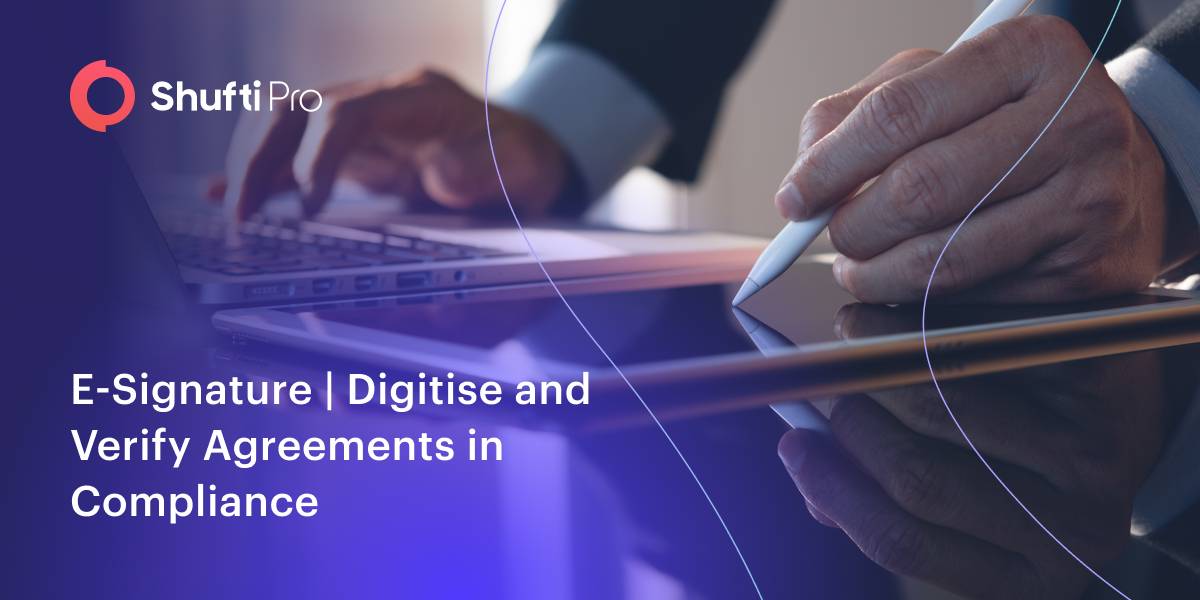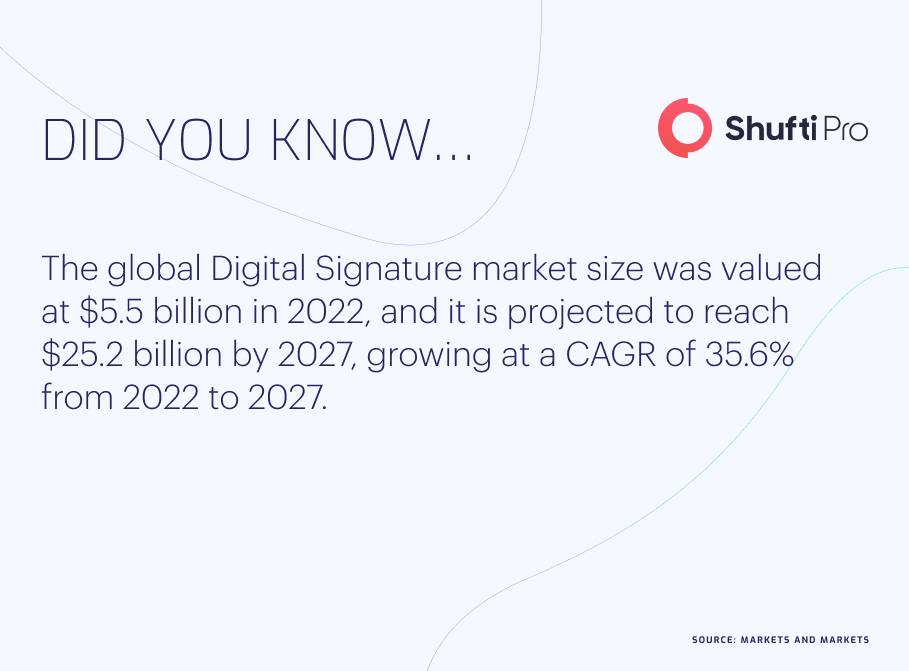E-Signature | Digitise and Verify Agreements in Compliance

The use of electronic signature, or e-signature, has transformed business dealings. The days of seeing a never-ending stack of paperwork accumulate on the desk and waiting weeks for signed agreements to be executed are long gone. Undoubtedly, technological advancements have made signing documents more convenient than ever, but there is also a risk of high-quality document forgery or forged signatures, which can cause financial losses and damage firms’ reputations.
With the advanced editing tools, it is easy to forge a sign, leaving no room for suspicion. It is reported by the Scam statistics that till today, the loss of attempts to gain personal information reached up to $47,663,679, with the number of reports increasing to 126,777. Reports with financial losses increased up to 2.9%.
Although e-signature offers a plethora of benefits, with it comes the challenges of fraud and scams that can cost businesses financial losses and unnecessary compliance penalties. To overcome this, first and foremost, understand what e-signature is, how it works, and then how to maintain compliance. Nonetheless, it’s crucial to comprehend the difference between eSigning and just copying and pasting the signature image into a PDF document, as this technology has become standard practice.
What is E-Signature?
A signature in electronic format is known as an e-signature or electronic signature. Putting simply, an electronic signature is provided by a signatory using electronic means rather than traditional wet ink. Nonetheless, it’s a procedure that uses computers to verify the signature and guarantee the document’s integrity.
Purchase orders, employment contracts, sales contracts, permission slips, rental/lease agreements, liability waivers, financial paperwork, and many more crucial documents have all been signed electronically in a variety of business contexts and industries.
An electronic signature that is encrypted and provides proof of signer identity is called a digital signature. Because reputable authorities verify digital signatures, the digital signature is typically approved.
E-Signature Verification: What is it?
Similar to a digital “fact check,” electronic signature verification certifies that the signature on a signed document was delivered by the signee listed on the document.
Whether signed with an eSignature on a computer or a mobile device, the information that is recorded by the device at the moment of signing includes the date, time, location, and IP address. Based on this information, it can be conclusively determined that the signee executed and owned the signature.
What is a Forged E-Signature?
In legal terms, forgery necessitates the presence of fraudulent intent; nonetheless, a forged signature can be defined as one that has been found to be authentic and in which actual fraud has been made. Determining the “intent” of the writer is not the responsibility of a document examiner; the ultimate determination of whether a contested signature or document is a forgery rests with the judge or jury.
A forensic document examiner often receives requests to examine a suspect signature on an online document. Carefully examining the signature’s line quality, speed, letter forms, height relationships, and size is necessary to determine whether or not it is authentic.
Today, criminals utilise modern technology and editing tools like Adobe with one click or tracing. They can create the perfect e-signature, making it hard to differentiate whether it is an original or forged signature. On paper, it is easy to identify and verify the signature through lines and strokes, but verifying e-signature is hard because sophisticated tools make the exact copy of it, making it difficult to identify or verify for forgery.

How Does Electronic-Signature Verification Work?
Encryption, based on public and private keys, verifies electronic signatures. Every public and private key is created simultaneously and is connected from the beginning, much like a partnership. When the “partner” public key and the private key are joined, data can be decrypted.
Identity Verification
Verifying a signature functions similarly to entering into a website using an email address and password. Business identification can be validated using those two pieces of information combined.
When a signer uses an electronic signature, it contains all the information needed for the identity verification process. They will be providing the public key and any additional information needed to validate their signature together with the original and encrypted material when they sign and return an agreement.
Thus, by decrypting the file using both keys, users can confirm that a signature is authentic and that their document hasn’t been tampered with or signed by someone else.
Authenticity Verification
Verifying an electronic signature is also essential for making sure that there is only one copy of the document and that no forged copies are in circulation. E-signature verification validates the original in case it has been tampered with.
The public key that functions with the private key will only be present in the authentic document because of verification. As a result, the certificate authority can quickly determine which document is authentic and which isn’t.
Ensuring Signature Integrity
Ensuring the legitimacy and consistency of digital signatures is crucial for the verification process. Cryptographic hash functions are often used to achieve signature integrity. These features create a distinct digital fingerprint of the signed document, which may be compared to the original fingerprint to identify any changes.
Complex cryptographic algorithms are used to generate these digital fingerprints. It is possible to identify any tampering or manipulation of the signature using a hash value generator.
Digitise Agreement with Compliance
It is a regulatory requirement by organisations to verify the e-signature for authenticity. A few regulations include:
eIDAS
The European Union’s (EU) regulatory law governing electronic transactions and identity is known as Electronic Identification, Authentication and Trust Services, or “eIDAS.” The legal specifications for electronic signatures are part of eIDAS. These specifications give businesses a reliable, safe, and secure online document signing solution.
Three legal levels of electronic signatures are recognised by eIDAS:
- Simple Electronic Signatures (SES)
- Qualified Electronic Signatures (QES)
- Advanced Electronic Signatures (AES)
HIPAA
Because HIPAA lacks precise criteria for how signed papers and digital signatures should be recorded whilst adhering to legal requirements, these documents and digital signatures fall into an odd category under the regulations.
Before the legislation was passed in 2003, all of the provisions regarding electronic signatures were removed from the HIPAA Security Rule (1998).
Regarding electronic signatures and HIPAA’s privacy requirement, the Department of Health and Human Services (HHS) website now mentions the following:
“Assuming that the electronic contract satisfies the applicable requirements of State contract law. The Privacy Rule generally allows for electronic documents, including business associate contracts, to qualify as written documents for purposes of meeting the Rule’s requirements.”
Put differently, using e-signatures or an e-signature solution to sign documents does not compromise PHI’s integrity and does not violate HIPAA regulations as long as State contract law is followed.
ESIGN
According to the US Federal ESIGN Act, an electronic sound, symbol, or procedure connected to a contract is considered an “electronic signature.” A person executes or adopts it with the intention of signing that contract.
A new age of document streamlining was introduced in all the US places where federal law is applicable in 2000 when the US government established the ESIGN Act to facilitate the adoption of electronic signatures. According to the act, an electronic signature is defined as “an electronic sound, symbol, or process, attached to or logically associated with a contract or other record and executed or adopted by a person with the intent to sign the record.” This act ensures that:
- E-signatures are admissible as proof in legal proceedings.
- Wet signatures and eSignatures are equally acceptable legal options.
- Electronic documents remain legitimate and enforceable, and their effect is uncontested.
UETA
To offer a state-by-state legal framework for the use of electronic signatures, the Uniform Law Commission also produced the Uniform Electronic Transactions Act (UETA) in 1999 in addition to the ESIGN Act. It describes the legal signature requirements for anything from electronic transactions to document retention to transferrable records. 48 US states have embraced UETA.
Illinois
According to Illinois’ 1999 Electronic Signature Law 5 ILCS 175/1-101 New York, certain eSignature formats are more secure than others. These are a few characteristics that define these eSignatures:
- The “secure nature” of the signature, applied by both parties in a verifiable manner, is acknowledged by both sides,
- produced in a way that is regarded to be economically reasonable,
- and dependable for all parties acting in good faith.
ESRA
In New York, electronic signatures are considered legally binding, just like wet signatures, according to the 2000 Electronic Signatures and Records Act (ESRA). For those who want to use eSignatures within the scope of ESRA, there is even a best practice guide available.
Final Thoughts
It’s crucial to remember that the precise approaches and strategies may change based on the technology platform or service provider utilised. Selecting a reliable and trustworthy electronic signature solution can assist companies in resolving compliance-related concerns and safeguarding their finances and corporate integrity.
e-Signature verification is a necessary safety measure to guarantee that documents are completely protected by law and have verifiable signatures, whether by the we-ink or electronic. Our all-inclusive ID document verification and e-signature verification solution uses cutting-edge technology to enhance conventional approaches to identity verification. The service looks at signature characteristics like patterns and holograms to determine whether or not AI-powered methods have been used to alter them. Therefore, choosing an electronic signature verification solution will help businesses authenticate confidential documents whilst avoiding the risk of crimes.

 Explore Now
Explore Now













